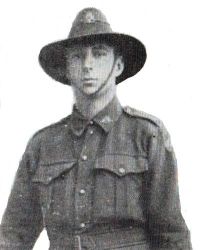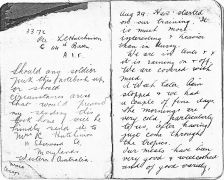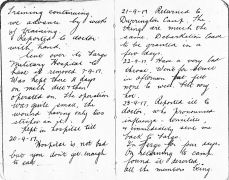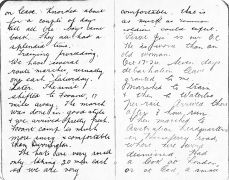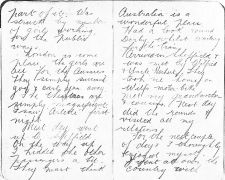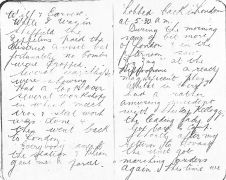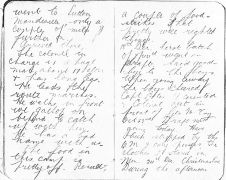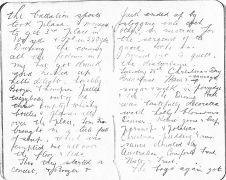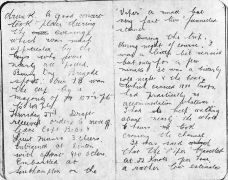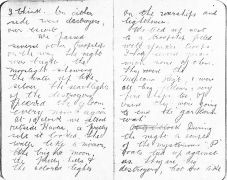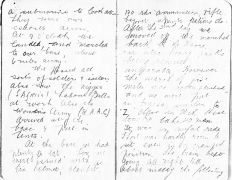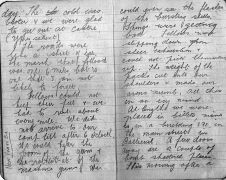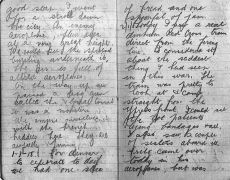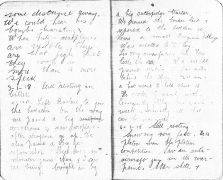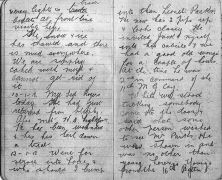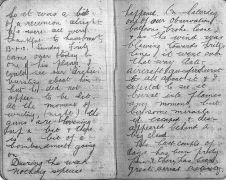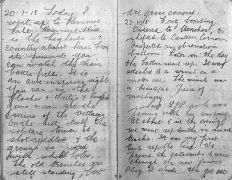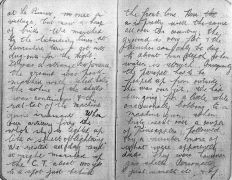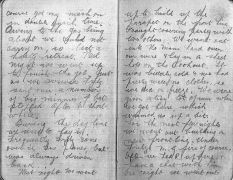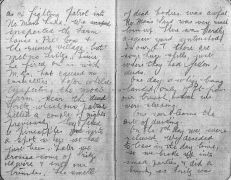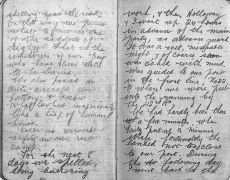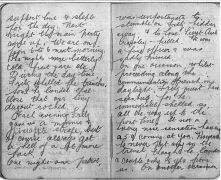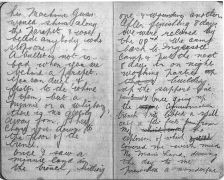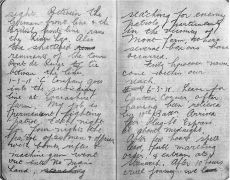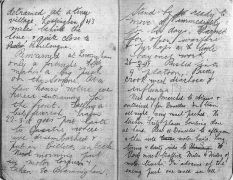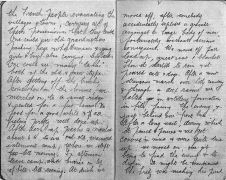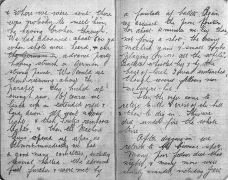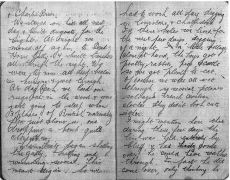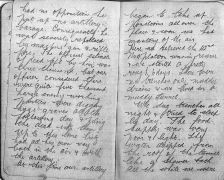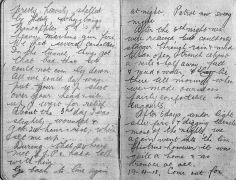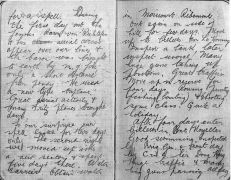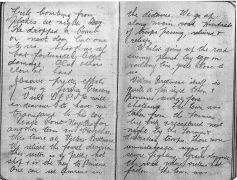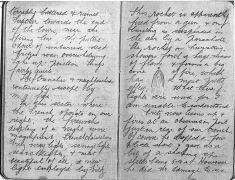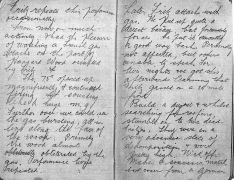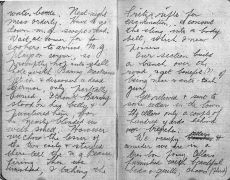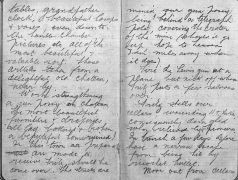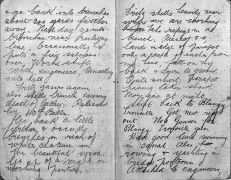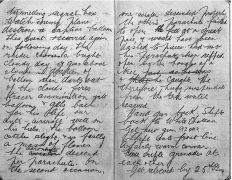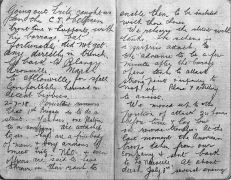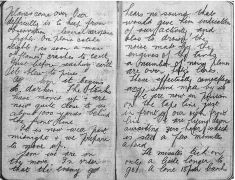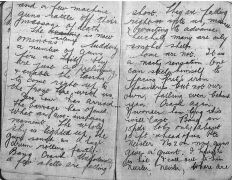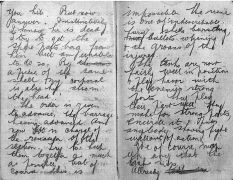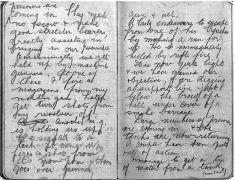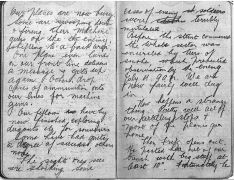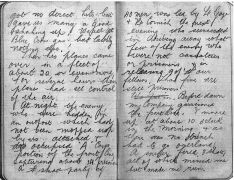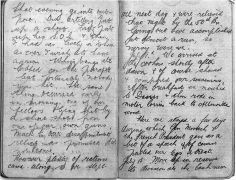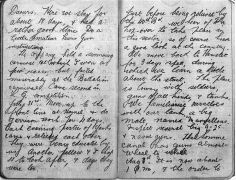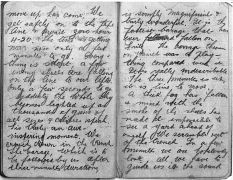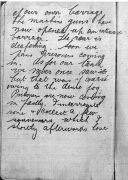HUTCHINSON, Leslie Charles - 3376
| Original items held by the Army Museum of Western Australia |
| Conflict | World War 1 |
|---|---|
| Service Arm | Citizen Military Force Australian Imperial Force |
| Unit | 88th Infantry CMF 44th Infantry Battalion |
| Service No. | 3376 |
| Service Arm | Army |
| Date of Birth | 8 Nov 1898 |
| Birthplace | Fremantle, WA |
| Residence | Maylands, Perth, WA |
| Date of Death | 22 Aug 1918 |
| Relatives | Father - Charles Hutchinson Mother - Mary Elizabeth Hutchinson |
Handwritten diary dated from 29th August 1917 until 7th August 1918. Leslie Hutchinson was killed 2 weeks after his final entry and his diary was returned to his family back in Perth, Western Australia.
Part 1 - 29th August 1917 to 1st March 1918
3376
Pte L C Hutchinson
44th Btn
A.I.F.
Should any soldier pick this notebook up, or should circumstances arise that would prevent my sending this home will he kindly send it to
Mrs C Hutchinson
11 Sherwood St
Maylands
Western Australia
(war censor)
Aug 19 Have started our training. It is much more interesting and heavier than in Aussy.
We are in tents & it is raining on & off. We are covered with mud.
A Week later. Rain stopped and we had a couple fine days. The mornings are cold, particularly to us, having just come through the tropics. Our meals have been very good and well cooked and of good variety.
Training continuing, we advance by weeks of training.
Reported to doctor with hand
Sent over to Fargo Military Hospital to have it removed 7-9-17 Was kept there 4 days on milk diet & then operated on. The operation was quite small, the wound only having 2 stitches in it.
Kept in hospital till 20-9-17.
Hospital not bad but you don’t get enough to eat.
21-9-17 returned to Durrington Camp. The things are much the same. Debarkation leave will be granted in a few days
22-9-17 Have a very bad throat. Went for stroll in the evening but felt none to well. Felt very hot.
23-9-17 Reported to doctor, who pronounced influenza-tonsillitis & immediately sent me back to Fargo.
In Fargo for 4 days. On returning to camp found it deserted. All the members being on leave. Knocked about for a couple days till all the boys came back. They had a splendid time.
Training proceeding. We have several route marches, usually one each Saturday.
Later. The unit moved to Fovant, about 17 miles away. The march was done in good style and we arrived pretty fresh. Fovant is much more snug & comfortable than Durrington.
The huts are very small only taking 20 men so we are very comfortable, that is as much as “common soldiers” could expect.
“Pistol Joe” is our O.C. He is worse than an old woman.
Oct 24-17. Seven days debarkation leave granted to me. Marched to train & then to Waterloo per rail. Arrived there after 3 hour run. Then marched to Australian Headquarters in Horseferry road, where we were dismissed. Had a look at London or at least a small part of it. Was struck by number of girls working for the public ways.
London is some place, the girls are all for the Aussies. They simply surround you & cart you away.
The theatres are simply magnificent. I saw “Arlette” first night.
Next day went up to Sheffield. On the way up I kidded the other passengers a bit. They must think Australia is a lively place. Had a look around Derby, whilst waiting for the train.
Arrived in Sheffield & was met by Wilfred & Uncle Herbert. They took me home on Wilf’s motor-bike
Met my grandmother & cousins. Next day did the rounds & visited all my relations.
For the next couple days I thoroughly enjoyed myself.
I went all over the country with Wilf & Earnest.
While I was in Sheffield the Zeppelins paid the district a visit but fortunately no bombs were dropped. Several searchlights were showing.
Had a look over several workshops in which much iron & steel was done & then went back to London.
Everyone came to the station & Lilian gave me a parcel.
Lobbed back in London about 5-30 am.
During the morning saw a bit more of London & in the afternoon saw “Zig-Zag” at the Hippodrome, a really magnificent play. Whilst in there I had a rather amusing incident with Shirley Kellogg, the leading lady.
Got back to camp. Shortly after my return to Fovant the unit got marching orders again. This time we went to Sutton Mandeville, only a couple of miles further on.
Arrived there. The colonel in charge is a huge man, about 17 stone, & has long legs. He leads the route marches. He leads in front we gallop behind on behind to catch up. He has a bad name with us.
The food in this camp is pretty off. Result, a couple of food strikes. That pretty well righted things.
18th Dec First batch of _ went on draft. Said good-bye to the boys. When going away the boys cheered Capt Bales & counted & Colonel out in front of General McKay
Oct 23rd Draft not going today. Have been stripped by the Q.M. & only possess the clothes I stand in.
Mon 24th Dec Christmas Eve.
During the afternoon the battalion sports took place. I managed to get 3rd place in 100 yards & 2nd in 220 yards. During the evening all the fellows in my hut got drunk & hecked up hell’ s delight. Firstly Boozer Thompson got everyone out of bed, threw empty whisky bottles & glasses all over the place. Tom _ brought in a tub of full of soup which was emptied out all over the floor & beds.
Then they started a concert, & Boozer & Jack ended up by slogging into each other, in mistake for the sergeant out of the guard, who was turned out to quell the disturbance.
Dec 25th Christmas Day.
Breakfast. Ham & sausages, sugar & milk in porridge, & tea. The Dining Hall was tastefully decorated with holly blossoms.
Dinner. Roast goose & beef, parsnips & potatoes, Christmas pudding & rum sauce donated by Australian Comfort Fund, nuts & fruit.
The boys again get drunk. A good concert took place during the evening which was much appreciated by the boys who were nearly all potted.
Boxing Day. Brigade sports. Our F.B. won the cup by a majority of 107 ½ pts to 49 pts.
Thursday 27th Draft received orders to move off. Gave Capt Bales & Lieut. Munro 3 cheers.
Entrained at Denton with about 900 others. Embarked at Southampton on the “Viper” a small, but very fast two funnelled steamer.
During the trip, during night of course, I was a little bit seasick but only for a few minutes. It was a bitterly cold night & the boat which carried 1850 troops had practically no accommodation whatever. I had to keep walking about nearly the whole 6 hours we took crossing the channel. It was said that the “Viper” travelled at 22 knots per hour, a rather low estimate I think. On either side were destroyers, our escort.
We passed several other troopships on the way. The night was bright, the moonlight showing the water up like silver. The searchlights of the destroyers pierced the gloom every now and then. At 1 o’clock we stood outside Havre, a pretty site it looked. The water like a mirror, the bright moon, the pretty hills & the colored lights on the warships & lighthouses.
We tied up next to a troopship filled with Yankee troops. I had several yarns with some of them. They were the Montana Regt, & were all very big fellows & very fine chaps too. Of course they were going to end the “gardarm war”.
During the night a couple of the mysterious ”P” boats tied up against us. They are big destroyers but are like a submarine to look at. They were our escorts across. At 9 o’clock we landed, and marched to our base, about 6 miles away.
We passed all sorts of soldiers & sailors. Also saw the Nigger (S. Africa) Labour Battn at work. Also the Women’s Army (W.A.A.C.) arrived at the base & put in tents.
At the base we had plenty to eat. Here we were issued with a tin helmet, blanket, 120 rounds of ammunition, rifle bayonet, u’pants, rations etc. After the 2nd day, we moved off. We marched back to Le Havre, our extra heavy packs being almost unbearable. However, the march of five miles was accomplished & we were put in trucks similar to “Z” class in W.A. These trucks take 40 men. It was an awful ride. There was hardly room to sit, even in a cramped position. The train kept going all night till about midday the following day. The cold was bitter & we were glad to get out at Castre (Ypres salient). The roads were like a sheet of ice. The march that followed was only 6 miles, but is one that I am not likely to forget.
Fellows could not keep their feet & we had to rest about every mile. We did not arrive at our camp till after 6 o’clock. We could hear the boom of the guns & the rat-tat of machine guns. We could even see the flashes of the bursting shells. Things are getting bad. Fellows were slipping down from sheer exhaustion & could not pick themselves up. The weight of the packs cut into our shoulders & made our arms numb. All this in an icy wind.
At length we were placed in billets, mine is in a building 191 in the main street in Baillieu. A few doors away are a couple of bomb shattered places. This morning after a good sleep I went for a stroll down the city. An enemy aeroplane flew over at a very great height. We could see the shrapnel bursting underneath it. The air is full of allied aeroplanes. On the way up we passed a big gun called the “Great Consul”. It was a monster. We amuse ourselves with the French kiddies here. They are awfully funny.
1-1-18. For dinner to celebrate the day we had one slice of bread and one spoonful of jam.
2-1-18 Today I saw a real dinkum Red Cross train direct from the firing line. I considered it about the saddest thing I have ever seen in this war. The train was pretty to look at & came straight from the Ypres front. I could see the _ patients lying bandages & all. I could also see a couple of sisters aboard it.
Frits came over today in his aeroplanes, but was some distance away. We could hear his bombs bursting. When Fritz’s aeroplanes are visible, they are that high up that they look no more than a mere speck.
3-1-18. Still resting in billets.
4-1-18 Left Baillieu to join the Battalion. On the way we passed a big aerodrome & saw aeroplane after aeroplane go up. We also passed a big gun repair shop. There were some monster guns there & I saw one being brought in by a big caterpillar tractor.
We crossed the border line & reported to the battalion at Loere, a small Belgium village. Was allotted to “C” Coy. Tis very uncomfortable here. Very little to eat. We are at present resting a few miles behind the lines. 24 in a hut meant to hold 12. No water to wash with. Consequently filthy. One wash a week is usually all that can be managed.
6-1-18 Still resting. Snowing very fast. No. 10 platoon won the platoon competition. Saw an anti-aircraft gun in its war paint. Star shells & verey lights & tracer bullets at front line visible here.
The snow & ice has thawed & there is mud everywhere. We are simply caked with mud & cannot get rid of it.
10-1-18. Met Sed Rogers today. He had just returned from blighty. Also met H.A. Lightfoot. He has been wounded & his tail down a treat.
12-1-18. Went for a stroll into Loere & who should I bump into than Lionel Parks. He has 2 pips up & looks classy. He invited Jack & myself into his cubicle & we had a good old wongi for a couple of hours. At the time he was 2nd in command of the 11th M.G. Coy.
While we stood talking somebody came to the door & said that some other person wished to see My Parks & was no other than young Lorenzo Young from the 16th Battn. So it was a bit of a reunion alright. We were all very thankful to have met.
13-1-18 Sunday. Fritz came over today in one of his planes. I could see our “Archies” bursting about him but he did not appear to be hit. At the moment of writing (night) the guns are livening up a bit & there is a bit of a bombardment going on.
During the week nothing special happened. On Saturday one of our observation balloons broke loose & as the wind was blowing towards Fritz’s lines it went over that way. Anti-aircraft gunfire burst all about it & I expected to see it burst into flames any moment, but by some miracle it escaped & disappeared behind a big cloud.
The last couple of days has been pretty fine & there has been great aerial activity.
20-1-18 Today I went up to Kemmel hill, Kemmel Hill is the highest country about here. From its summit you can watch the main battle fields. It is an awe inspiring sight. You can see the flashes & Fritz’s & English guns & can see the ruins of villages. On the hill itself the solitary tower is shot riddled
& the ground itself is riddled with shell holes. The old trenches are still standing but are grass covered.
27-1-18 Fritz bombing. Ordered to trenches, & shifted to Canteen Corner. Inspected an observation balloon. Later in the day the balloon went up. It was attached to a winch on a motor car. The winch was a beautiful piece of machinery.
Saw L.J.P as he was passing with his company. At about 5 in the evening we went up to the in small tracks. It was my first trip up the line. We passed the catacombs & went through the now famous Plug St Wood. We got out at La Bisset, once a village, but now a heap of bricks. We marched to the Subsidiary lines, at Lancashire Farm, & got into dug-outs for the night.
It was a strange experience, the ground was pock-marked with shell-holes, the whine of shells was continuous & the rat-tat of machine guns incessant. When our artillery fires the whole sky is lighted up like a sheet of lightening. We rested all day & at night marched up the C.T. about 1000 yds to a spot just behind the front line. Here as is pretty well the same over all the country, the ground is very flat & the trenches can only be dug to about to about knee depth when water is struck. Consequently the parapet has to be heaped up from outside. This was our job. We had been going for a little while, occasionally bobbing to a machine gun, when Fritz sent over a couple of pineapples, followed by more what were apparently duds. They were however gas shells. Personally I just smelt it, & of course got my mask on in double quick time. Owing to the gas being about we could not carry on, so beat a hasty retreat. Next night we went up to finish the job. Just as we arrived Fritz sent over a number of big minnies but stopped after a short while.
During the day time we used to lay in. Frequently Fritz came over in his planes but was always driven back.
Next night we went up to build up the parapet on the front line. I caught covering party with two others. We went out into No Mans Land over our wire & lay in a shell hole on the lookout. It was bitterly cold & we had pretty well no clothes, so we did a freeze. We were given a tiny tot of rum when we got home, which warmed us up a bit.
For the next few nights we went out building a new front line. Under Fritz’s M.G. fire of course. Often see Led R up here & have a chat with him. One night we went out as a fighting patrol into No Mans Land. We inspected the Farm house & Pill box & the ruined village but met no Fritzs. Twice he fired on us with M.Gs. but no caused no casualties. Later whilst inspecting the moab farm, near the dead Fritz which our patrol killed a couple of nights previously, they fired 6 pineapples into a spot where we had just been. Later we crossed some of Fritzs old wire & into our trenches. The smell of dead bodies was awful. No mans land was very much torn up. The was hardly a square yard untouched. In our C.T. there are some huge shells, just where they had fallen, duds.
One day a whizz-bang landed only 15 ft from our trench where we were sleeping.
One soon learns the art of ducking.
On the 8th day we were relieved. We decided to leave in the day time, so we broke up into small parties & did a bunk, as Fritz was shelling near the road. On the way we passed what to me is one of the saddest of sights. That is the cemeteries our boys who been able to be buried.
We also passed an anti-aircraft gun battery & I saw what looked suspiciously like a heap of human bones.
Later we arrived safely in our rest camp.
For the next 8 days we spelled, doing bull ring work, & then Holloway & I went up 24 hours in advance of the main party, as advance guard. It was a wet, miserable night, & of course soon was caked with mud. Was guided to our post in the front line, No 22, where we were put into the running by the 42nd Bn.
We had hardly been there a few minutes, when Fritz put up a minnie strafe, fortunately the landed not too close to our post. During the following day I went back to the support line & slept for the day. Next night the main party came up. We are on from 6 to 6 next morning. The nights were bitterly cold, frost & ice etc. During the day time Fritz shelled the trenches. Some he landed that close that our tiny dugout rocked.
Each evening Fritz gave us a minnie & pineapple strafe, but of course always got a hell of a lot more back.
One night our patrol was unfortunate to stumble on Fritz hidden away, & to lose Lieut Aub. Crawley – killed. He was a fine officer & was sadly missed.
On one occasion, whilst proceeding along the communication trench in daylight, Fritz must have seen us, for he immediately shelled us, all the way up to the front line. It is not a very nice sensation having a 5.9 coming at you. However, he never put any in the trench, though he landed a couple only 5 yds away from us. On another occasion his Machine Guns would skim along the parapet, & woe betide anybody who stops one.
A bullet is not so bad when you are behind a parapet. You can duck & listen to the whine of them. But a minnie or a whizbang, there is no getting away from. They chase you down to the floor of the trench.
Once I saw a minnie land in the trench, killing one & wounding another. After finishing 8 days we were relieved by 42nd. We came back to Ingersoll camp & put the next days in on night working parties up the building up the support line.
1-3-18 1Once going up the support Communication trench Fritz lobbed a shell only a few feet from me which were the explosion of which covered me in much No Mans Land during the day to me presented a wonderful
Part 2 - 1st March 1918 to 7th August 1918
sight. Between the German front line & the British front line runs the River Lys. Also the shattered remnants of the town Pont de Rouge lie between the lines.
1-3-18 “C” Company goes into the subsidiary line at Lancashire farm. My job is permanent fighting patrol. Each night for four nights the patrol of 20 men & officer with bombs, rifles & machine guns went out into No Mans Land, searching for enemy patrols, particularly in the vicinity of Moat farm where several box ons have occurred. Fritz however never came within our reach.
6-3-18 Leave for Canteen Corner, after having been relieved by 18th Battn. Arrived per Plug St Express at about midnight.
After a few hours spell leave, full marching order & entrain at Steinwerk. After 10 hours cruel journey we land detrained at a tiny village Lottinghen, 43 miles behind the line, & quite close to Boulougne.
Remained at Lottinghen only a fortnight, Fritz makes a big push on the Somme. At a few hours notice we were entraining for the front. Feeling a bit feverish.
22-3-18 Train goes post haste to Caestre where we disembarked & put in billets in Eiche. Next morning put in motor lorries, & taken to Blaminghen. Standby ready to move off immediately for two days. Warned for open warfare & perhaps a little bayonet work.
26-3-18 Pushed into 9 Platoon. Pretty crook with diarhoea & influenza (?).
Next day marched to Aregues & entrained for Dovelles. In train all night, very much packed. No tucker. Fritz planes bombing close at hand. Rest at Dovelles to afternoon & then into buses motor buses. Long, tiring & dusty ride to Blamingden. Very much traffic. Miles & miles of motor trucks. In advance of the enemy push one could see all the French people evacuating the villages & towns, carrying all of their possessions that they could. One could see old grandmothers pushing huge wheelbarrows & young girls & boys also carrying big loads. One could also see many “tanks” both of the old & new type. After getting off the trucks, somewhere on the Somme, we marched on to a small ridge & rested for a few hours. No food for a good while & all feeling pretty well done up.
After dark, up packs & marched about 6K. to an old, evacuated internment camp where we slept for till morning. In afternoon leave camp & bivouac on top of hill till evening. At dusk we moved off, after somebody accidently exploded a grenade amongst a large body of men, fortunately without serious consequence. We moved off, full load up, great coat & blanket. Then it started to rain & it poured cats & dogs. After a most strenuous march over hilly country & through a deep ravine we halted in artillery formation in file, facing the enemy, & just behind our front line. After a long wait, during which it poured & poured & we got covered in mud & were quite done up, we moved on, our job being to find the enemy & to dig in. It might be mentioned the Fritz was making his push & where we were sent, there was nobody to meet him, he having broken through. We had advanced about 600 yds when shots were heard, & our the Germans advance guard having struck a German strong point. We could see them running about the parapet & they kicked up enough row. Of course we lined up in extended order & laid down. Up went a Verey light, & the Fritzs reinforce lights, & then Machine Guns opened up upon us.
Almost immediately we had a good many casualties, including several killed. We advanced further & were met by a fusilade of bullets. Again we assumed the prone position. For about 4 minutes we lay there, not firing a shot, the enemy machine guns & small bombs playing on us all the while. Bullets whistled by & by the best of luck I was untouched, though several fellows near me were hit.
Then the order came to retire to the crest of the hill & then to dig in. This we did, under fire the whole time.
After digging in we retired to the bivouac spot. Many poor fellows died that night, & many more were severely wounded, including J.O.W. & Charlie Pr_.
We stayed on hill all the next day & built dugouts for the night. At night we moved off again to Dead Horse Gully & built trenches all through the night. We were by now all dead beaten & hungry & wet through.
At day break we laid our rugs out in the wood & was just going to sleep when 3 planes of British nationality flew just above us, one dropping a bomb quite close to us.
Then Fritz began shelling the gully, killing & wounding several. This meant dig in so we had to work all day digging in limestone & chalkstone. In these holes we lived for the next few days, digging of the night. In a little village close at hand, the boys got poultry, rabbits, pigs, & cattle so we got plenty to eat. Of course we were all wet through so several fellows salvaged French civilian clothes. They didn’t look cute either.
I might mention here that during these few days the line was held entirely by bluff, & had Fritz come over, he could have walked through. In fact he did come over, only thinking he had no opposition he put up no artillery barage. Consequently he was severely repelled by machine gun & rifle fire. The official estimate of dead left by him was three thousand, but our officer, considered that there were quite five thousand. Large enemy working parties were digging huge graves all the following day & piling the dead into them. Up to this time Fritz had all his own way, both in the air & with the artillery.
At this time our artillery began to take up positions all over the place & soon we had mastery of the air.
Here we relieved the 42nd No 9 Platoon was in reserve & we started a pretty rough 6 days. There were no trenches, only muddy drains & we lived in a muddy tunnel.
We dug trenches all night & tried to sleep by day. The food supply was very poor & light. The water dripped from the roof of the tunnel like a shower bath. All the while we were pretty heavily shelled by Fritz, whizzbangs, pineapples, pineapples, & heavy machine gun fire. We had several casualties. In the tunnel. things got that bad that we could not even ly down. All we could do was put your w.p. sheet over your head & sit up & wait for relief.
About the 3rd day I was slightly wounded & got 24-hour rest, which set me up.
During that 24 hours, I met L.J.P. & had a talk with him.
Go back to line again at night. Patrol now every night.
After the 6th night we were relieved, but could only stagger through rain & mud to an open trench about a mile & half away; full & mud & water; & lay lie there till morning when we made ourselves fairly comfortable in dugouts.
After 6 days, under light shell fire, & digging trenches most of the nights, we again went into the line. This time however it was quite a home & no trouble at all.
19-4-18 Came out for a spell. During the first day out, the famous Baron von Richtofen & his circus aerial circus appear over our lines, & the baron was brough to earth by m.g. fire, only a short distance from possy. He used a new type triplane. Great aerial activity & many Fritz planes brought down.
To our surprise our spell last 2 days only. The second night we moved up into a new sectory & spent five days there. Water carrier. Obtain water in Mericourt Ribemonb. Out again on side of hill for a few days. Move up to billets at La Horissog. Inspect a tank. Later inspect several. Many huge guns taking up positions. Great traffic. Move up in reserve for four days. Rowing punting fishing (bombing) & shooting, some class. Quite a holiday.
After four days, enter billets in Pont Noyelles. Good swimming. Inspected by Brig. Gen. & next day by c. in C. Sir Doug Haig. Huge traffic & many big guns passing all day. Fritz bombing from planes at night. Dop He dropped a bomb on next door but one to us. Shook us up, but fortunately little damage. Also others close at hand.
Observe pretty effects of m.g. firing tracers. Visit L.J.P. He will endeavour to have me transfer to his coy.
Leave Pont Noyelles for another term in trenches, this time at Villers-Brettoneux. We relieve the fourth division. This sector is a pretty hot shop & is the key to Amiens. One can see Amiens in the distance. We go up along main road. Hundreds of troops passing, relieved & reliefs.
Whilst going up the road enemy planes lay eggs on railway line, quite close to us.
Villers Brettoneux itself is quite a fair sized town & possesses several fine chateux. The town was taken from the Tommies by Fritz & recaptured next night by the Tommies & Australian troops. There were unmistakeable signs of severe fighting. Graves alongside the road where victims had fallen. The town was terrible battered & ruined. Further towards the end of the town, near the firing line, the putrid odour of unburied dead fritzes was over whelming. Take up position. Things fairly quiet.
The trenches & neighbourhood continually swept by m.g. fire.
In this sector, where the French operate on our right, the fireworks displays of a night were magnificent. French chandeliers, Fritz verey lights, sausage lights, searchlights, & most beautiful of all, a new light employed by Fritz. This rocket is apparently fired from a gun, & on bursting is suspended in the air by a parachute. The rocket on bursting, showers forth a huge mass of flame & forms a big cone of fire which has a most pretty effect. [diagram] What these lights are used for I am unable to understand.
Fritz now livens up & fires at an observation post just in rear of our trench. Of course he dropped a few a little short & gave us a bit of a shaking up, shells being 5.9s. however, he did no damage to us. Fritz repeats this performance occasionally. From now on much activity. I had the pleasure of watching a French gas attack on the part of Hangard Wood occupied by Fritz.
The 7.5s opened up magnificently & continued firing, sounding like a huge m.g. Further over we could see the gas bursting, all in line along the face of the wood. Presently the wood almost obleter obliterated by the gas. Performance twice repeated. Later Fritz attacks with gas. He put up quite a decent barrage, but fortunately for us, he put it mostly a good way back. Personally not affected, but others unable to speak. For two nights we got this, afterwards learning that Fritz had gassed a 35 mile front.
Build a dugout & whilst searching for roofing, stumble on two dead Fritzes. They were in a very advanced state of decomposition & were pretty high. Nick off. Made a souvenir match box cover from a German water bottle. Next night mess orderly. Have to go down m.g. swept road. Wait at corner for cookers to arrive. M.G. plays on corner, so promptly hop into shell hole with Barney MacManis [i.e. McManus]. Get in & discover a dead German, only partially buried. I think Barney stood on his belly & punctured him, for he nearly blinded us with smell. However we chose the lesser of the two evils & stayed there till the m.g. ceased firing. Then we imshied, I taking the Fritz’s rifle for examination, & convert the sling into a body belt, which I now possess.
Our section build a trench over the road, & get benefit (?!) of being near & anti-tank gun.
Get relieved & sent to some cellars in the town. The cellars only a couple of hundred yards behind our trenches.
We occupy trenches cellars & consider we are in a tres bon possy. Cellars furnished with beautiful beds & quilts; chairs (plush), tables; grandfather clock; beautiful lamps & vases, even down to the humble chamber, pictures, etc, all of the most beautiful & valuable sort. These articles taken from a delightful old chateau nearby.
Work strengthening a gun possy in chateau. The most beautiful furniture & draperies all lay battered & broken, a beautiful home ruined.
In this town all preparations were are made to receive Fritz should he come over. The streets are mined, our gun possy being behind a telegraph pole, covering the crater of the mine (should it go up, hope to heaven I am miles away when it does.)
Fire the Lewis gun at a plane, but nick off when Fritz puts a few salvos over.
Fritz shells our cellars, wounding H.T. Luke, consequently darn glad when relieved by pioneers. In trench a few days before having a narrow escape being hit by a ricochet bullet.
Move out from cellars & go back into trenches about 200 yards further away. Next day go into trenches near railway line. Occasionally he puts a few salvos over. Work shifts with engineers, tunnelling into hill.
Fritz gases again, also shells trench causing death of Gatley. Relieved by 40th Battn.
Go back a little further & occupy trenches in rear of white chateau, in the beautiful wood. Go up of a night in working parties.
Fritz shells heavily near where we are working. Take refuge in a trench. Piece of 5.9 lands on edge of parapet only a couple of inches from my head, falls on my back & down to ground. Quite unhurt, parapet having taken shock. More gas at night.
Shift back to Blangy Tronville. Get new rig-out. No.1 Gunner for Blangy Tronville.
Have good time swimming in canal. Also ba rowing & yachting in bridge pontoons. Attached to engineers tunnelling signal box. Watch enemy plane destroy a captive balloon.
This event occurred again on following day. The raider chooses a bright cloudy day, goes above clouds in direction of balloon then darts out of the clouds, fires tracer ammunition into balloon & gets back for his life, our anti-aircraft well on his heels. The balloon catches alight, & is fastly a mass of flames. The aviators aeronauts descend per parachute. On the second occasion, one aviator descended properly, the other’s parachute failed to open. He fell a great pace, & would have been dashed to pieces had not his parachute been ripped open by the boughs of a tree just as he was & there he caught. He therefore hung suspended from the tree until rescued.
Hand gun back. Shift back to White Chateau. Get new gun 9209? Shift onto front line. A fairly warm corner. Fire rifle grenades at each other.
Get relieved by 25th Bn. Going out Fritz caught us in the C.T. between Front Line & Support, with his barrage, but fortunately did not get any directly in trench. Go back to Blangy Tronville. March to Allonville, for spell comfortably housed in decent bivvies.
2-7-18 Persistent rumours that 11th Brigade is to do a stunt. Yankees, one platoon to a company, are attached to us. They are a fine body of men & very anxious to meet Fritz. NCOs & even officers are said to have thrown in their rank, to enable them to be with those chosen.
We rehearse the stunt with tanks. The scheme is a surprise attack, to the advance to be a few minutes after the barage opens, tanks to attack strong points & infantry to mop up. Planes & artillery to assist.
We moved up to the position of attack 24 hours before time & lay low in reserve trenches. At the last moment American troops taken from our company & sent back to La Neuville. At about dusk July 3rd several enemy planes came over. Our difficulty is to keep from observation. Several aeroplane fights. One plane catches alight & is soon a mass of flames, & crashes to earth. Just before it reached earth it blew to pieces.
At Soon it begins to darken. The tanks have moved up & are now quite close to us, about 1000 yards behind the front line.
It is now well past midnight & we prepare to move up.
Soon we are on the move. In order that the enemy get hears no sound that would give him indication of our activity, and also to drown the noise made by the engines of the tanks a number of noisy planes are over Fritz’s lines. These effectively camouflage any sound made by us.
We are now in position on the tape time, just in front of our own front line. We are lying down waiting zero hour which is still a few minutes ahead.
The minutes tick on only a little longer to go. A lone 10pde barks & a few machine guns rattle off their message of death.
The waiting silence is now ominous. Suddenly a number of guns fire at Fritz. They are just a preliminary & enable the tanks to come right up to the front line with us.
Zero hour has arrived. The barage has opened. What an awe-inspiring moment. The whole sky is lighted up. The guns sound as a huge drum rolling fastly. Bang. Crash. Unfortunately a few shells are falling short. They are falling right into us, massed & waiting. Luckily many are only smoke shells.
Some are not. It is a nasty sensation. One can steel himself to face Fritz’s iron foundries, but not our own, falling even behind you. Crash again. I wonder how long this will last. Bang. A 10pde lobs only 10 ft ahead of us. Pte Neisler [ie Niesler], no.2 on my guns gives a grunt. I know he is hit. I call out to him Neisler Neisler where are you hit. But now no answer. Instinctively I know he is dead. I try to get the spare parts bag from him but am unable to do so. By the same a piece of the same shell my corporal is also hit, also in the head.
The order is given to advance, the barrage having advanced. Am now left in charge of the remainder of the section. Try to keep them together as much as possible but of course this is impossible. The scene is one of indescribable fury, shells bursting, bullets whining, & the groans of the injured.
The tanks are now fairly well in position & play havoc with the enemies strong posts. They play their part well. They make for strong posts, encircle it, & put anyone showing fight out of action.
We of course mop up any that the tanks have missed.
Allready tanks are prisoners are coming in. They need no escort & make goof stretcher bearers, greatly assisting in bringing in our wounded.
Occassionally we get held up by machine gunners. At one of these I fire a magazine from my machine gun. Later get two shots from my revolver off.
A ma Another m.g. is holding us up. We signal to a tank. It comes up, fires a shot from it pom pom & then goes over gunner gun & all.
A Fritz attempts to escape from one of his trenches by making a run for it. He is immediately killed by rifle fire.
It is now quite light & we have gained our objective, & are digging a support line just below the brow of a hill, under cover of a smoke barrage.
Large numbers of prisoners are coming in, & the tanks are now returning. A couple have been put out of action.
I manage to get a tin of water from a tank (was out). Our planes are now busy. Some are now swooping down & firing their machine guns on the the enemy, shifting to a back area.
One plane even lands on out front line, delivers a message & gets up again. Others drop cases of ammunition onto our lines for machine guns.
Our fellows are have by now finished exploring dug outs etc. for souvenirs. Some have had quite a degree of success, others none.
The sights one sees are shocking. Some cases of enemy soldiers were shock terribly mutilated.
Before the stunt commenced, the whole section was encircled by teers of smoke, which prevented observation by the enemy.
July 4 9a.m. We are now fairly well dug in.
Now happens a strange thing. Pretty well all of our artillery stops & most of the planes go home.
Then Fritz opens out. He pasted hell out of our trench with big stuff at least 10”. Fortunately he got no direct hits, but gave us many a good shaking up. We all get Blue Cross gas, but luckily nothing else
Then his planes came over in a fleet of about 20, or even more. For several hours these planes had all control of the air.
At night then enemy who were hidden in an outpost which had not been mopped up by us attacked & dro occupied “A” Coys portion of the front line, capturing about 14 prisoners.
A small party of 40 men was led by Lt Gaze & Lt Cornish the next evening, who succeeded in driving away what few of the enemy were not casualties or prisoners, & in releasing 9 of our fellows. Thus five are still prisoners.
We put in Before dawn my company garrisoned the front line. I moved up at about 10 o’clock, & as there was no trench, had to go overland. A sniper fired 3 shots, all of which missed me but made me run.
That night go into out-post. Our artillery put up a shoot. Fritz put up his S.O.S then I had as lively a ¼ hour as ever I wish to have again. Wizz bangs etc. lobbed on the parapet but fortunately nobody was hit. The same thing occurred early in the morning, one of our fellows being hit by a short shot from one of our own guns. Much to our disappointment relief as promised did not come.
However plenty of rations came along, so we slept all next day & were relieved that night by the 50th Bn. Going out we accomplished at almost a run, so nervy were we.
July 8th We arrived at the cookers shortly after dawn & of course showed & compared our souvenirs. After breakfast we marched to Daours & then rode in motor lorries back to Allonville wood.
Here we stayed a few days during which Gen. Monash & the French President gave a bit of a speech & of course pulled our legs a treat.
July 15 Move up in reserve to the division at the bank near Daours. Here we stay for about 18 days, & had rather a good time. Do a little amateur Lewis gun instructing.
The Company held a swimming carnival at which I won a few races, but failed miserably at the Battalion carnival. Came second in L.G. competition.
July 31st Move up to the front line at Hamel, & do garrison work for 4 days. Each evening parties of yanks came & relieved each other. They were being educated by us. Another fellow & I had 4 to look after, & dags they were too.
Just before being relieved by the 40th Bn we hear of a hop-over to take place in this sector, so of course have a good look at the country.
We move back to Hamelet for 3 days spell, during which we learn a little about the stunt. The place is lowsy with soldiers, guns of all kinds, & tanks. We familiarize ourselves with our tank, a big male, named “Marvellous”. Inspect several big 9.25 & several naval guns. The Somme canal has guns almost wheel to wheel.
Aug 7th It is now about 1a.m. & the order to move up has come. We get safely on to the tape line & await zero hour 4.20 The time is getting near now only a few minutes to go. Everything is silent, a few enemy shells are falling on the line to our left. Only a few seconds to go. Suddenly the whole sky becomes lighted up as thousands of guns of all sizes & calibres speak. Tis truly an awe-inspiring moment. We crouch down in the trench. The barage, which is to be followed by us after three minutes durations, is simply magnificent & truly wonderful. It is the fasted barage that has ever followed fallen on Fritz. The barrage thrown on Hamel was a play-thing compared with it. It is really indescribable. The three minutes is up, it is time to move. A thick fog has fallen & mixed with the smoke of the shells has made it impossible to see a yard ahead of oneself. We scramble out of the trench. In a few minutes we are hopelessly lost. All we have to guide us is the sound of our own barage. The machine guns have now opened up an intense barrage. The roar is deafening. Soon we pass prisoners coming in. As for our tank we never once saw it, but that was of course owing to the dense fog.
Prisoners are now coming in fastly. I interrogate some & collect a few souvenirs, which I shortly afterwards lose
This soldier has been researched by the Birtwistle Local Studies Library. Information can be accessed on this link.
Leslie Hutchinson
